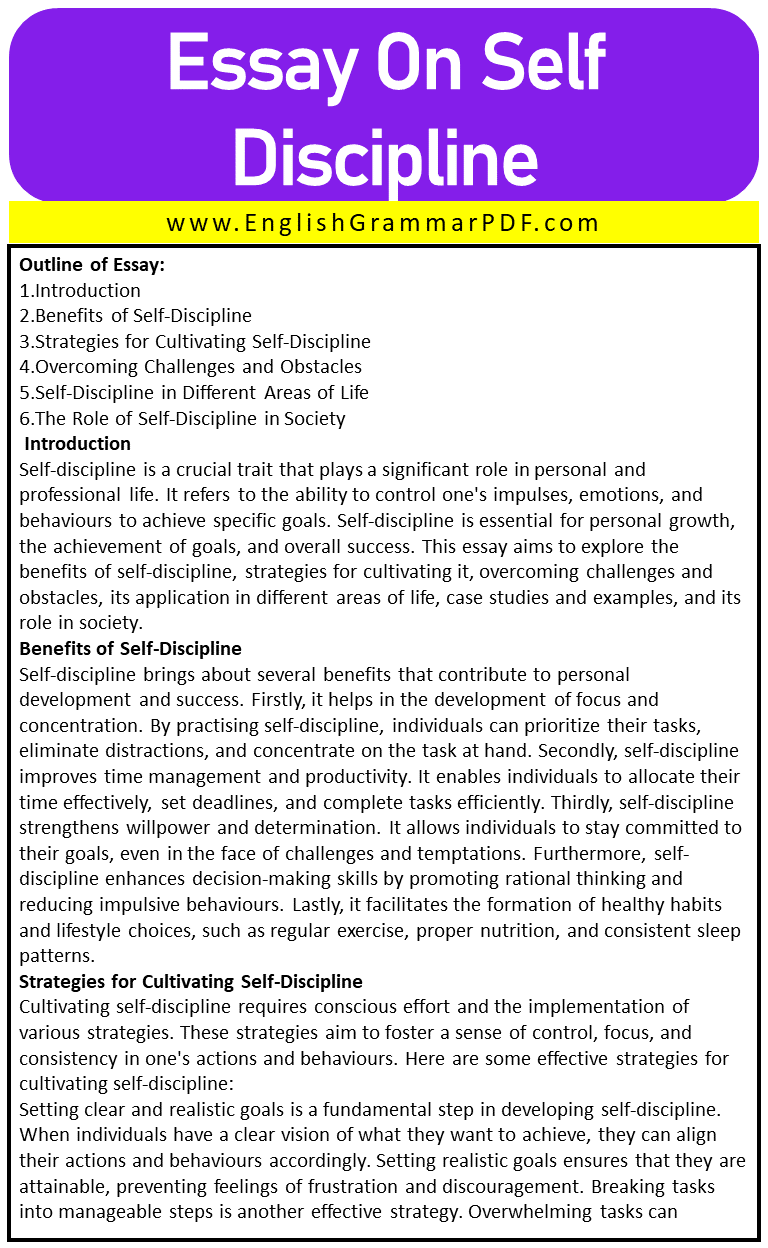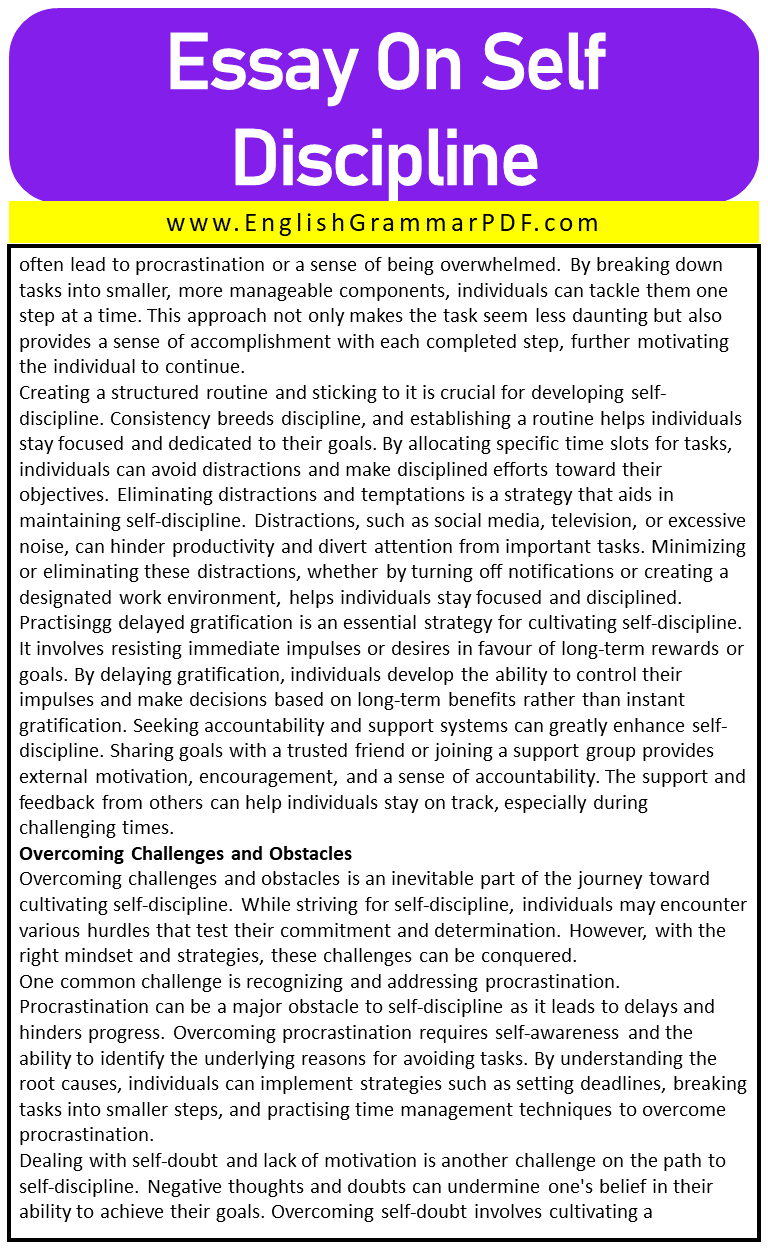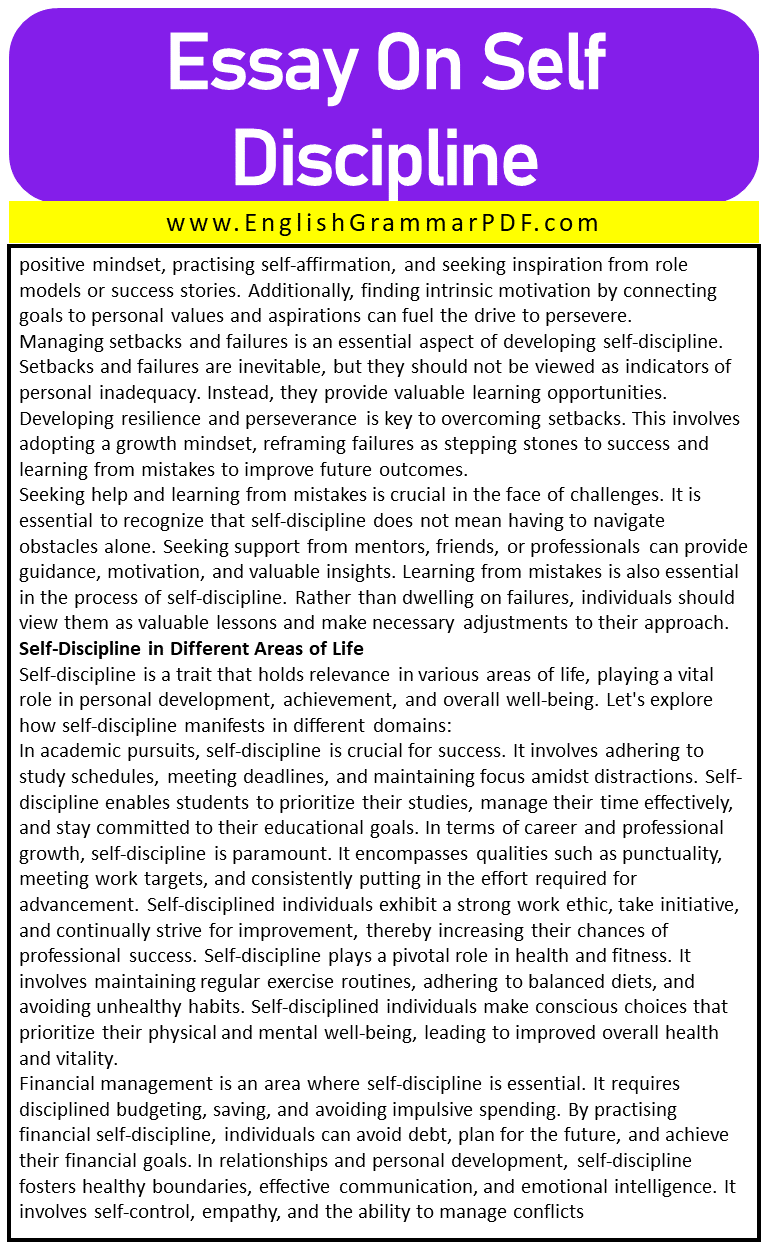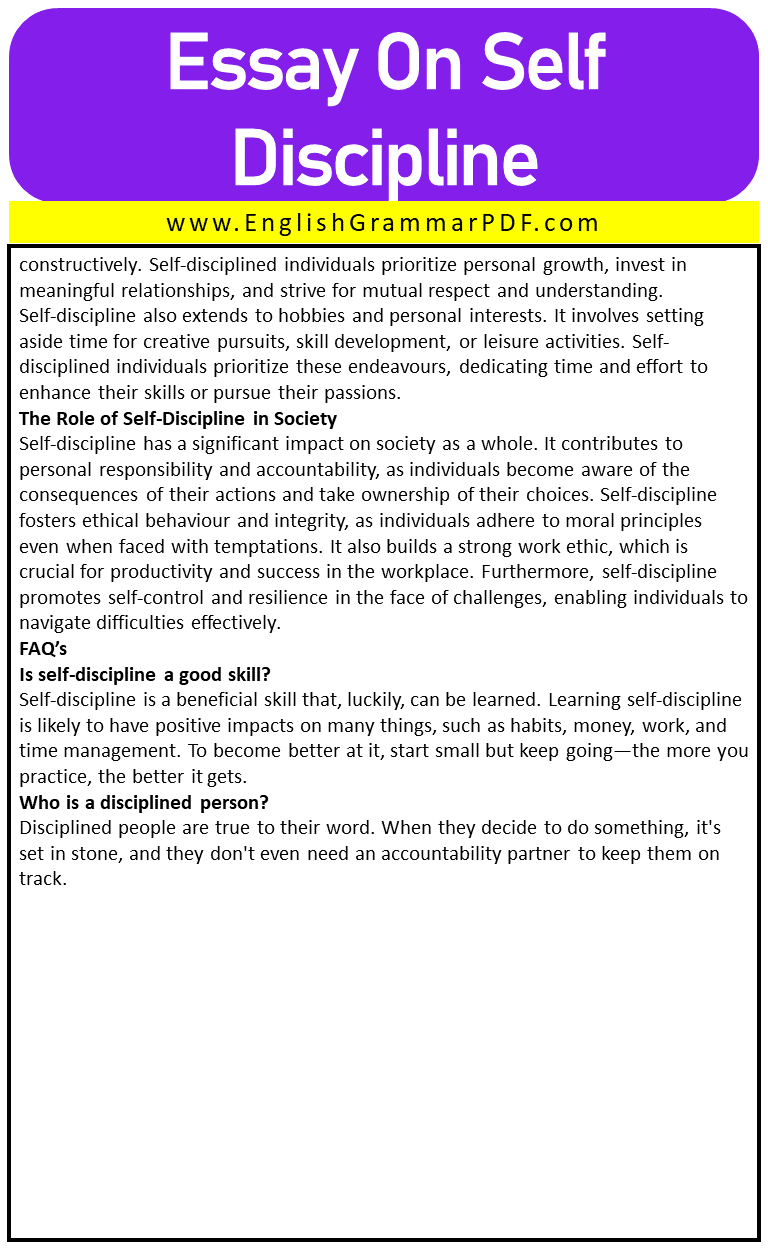Essay On Self Discipline
Outline of Essay:
- Introduction
- Benefits of Self-Discipline
- Strategies for Cultivating Self-Discipline
- Overcoming Challenges and Obstacles
- Self-Discipline in Different Areas of Life
- The Role of Self-Discipline in Society
Introduction
Self-discipline is a crucial trait that plays a significant role in personal and professional life. It refers to the ability to control one’s impulses, emotions, and behaviours to achieve specific goals. Self-discipline is essential for personal growth, the achievement of goals, and overall success. This essay aims to explore the benefits of self-discipline, strategies for cultivating it, overcoming challenges and obstacles, its application in different areas of life, case studies and examples, and its role in society.
Benefits of Self-Discipline
Self-discipline brings about several benefits that contribute to personal development and success. Firstly, it helps in the development of focus and concentration. By practising self-discipline, individuals can prioritize their tasks, eliminate distractions, and concentrate on the task at hand. Secondly, self-discipline improves time management and productivity. It enables individuals to allocate their time effectively, set deadlines, and complete tasks efficiently. Thirdly, self-discipline strengthens willpower and determination. It allows individuals to stay committed to their goals, even in the face of challenges and temptations. Furthermore, self-discipline enhances decision-making skills by promoting rational thinking and reducing impulsive behaviours. Lastly, it facilitates the formation of healthy habits and lifestyle choices, such as regular exercise, proper nutrition, and consistent sleep patterns.
Strategies for Cultivating Self-Discipline
Cultivating self-discipline requires conscious effort and the implementation of various strategies. These strategies aim to foster a sense of control, focus, and consistency in one’s actions and behaviours. Here are some effective strategies for cultivating self-discipline:
Setting clear and realistic goals is a fundamental step in developing self-discipline. When individuals have a clear vision of what they want to achieve, they can align their actions and behaviours accordingly. Setting realistic goals ensures that they are attainable, preventing feelings of frustration and discouragement. Breaking tasks into manageable steps is another effective strategy. Overwhelming tasks can often lead to procrastination or a sense of being overwhelmed. By breaking down tasks into smaller, more manageable components, individuals can tackle them one step at a time. This approach not only makes the task seem less daunting but also provides a sense of accomplishment with each completed step, further motivating the individual to continue.
Creating a structured routine and sticking to it is crucial for developing self-discipline. Consistency breeds discipline, and establishing a routine helps individuals stay focused and dedicated to their goals. By allocating specific time slots for tasks, individuals can avoid distractions and make disciplined efforts toward their objectives. Eliminating distractions and temptations is a strategy that aids in maintaining self-discipline. Distractions, such as social media, television, or excessive noise, can hinder productivity and divert attention from important tasks. Minimizing or eliminating these distractions, whether by turning off notifications or creating a designated work environment, helps individuals stay focused and disciplined. Practisingg delayed gratification is an essential strategy for cultivating self-discipline. It involves resisting immediate impulses or desires in favour of long-term rewards or goals. By delaying gratification, individuals develop the ability to control their impulses and make decisions based on long-term benefits rather than instant gratification. Seeking accountability and support systems can greatly enhance self-discipline. Sharing goals with a trusted friend or joining a support group provides external motivation, encouragement, and a sense of accountability. The support and feedback from others can help individuals stay on track, especially during challenging times.
Overcoming Challenges and Obstacles
Overcoming challenges and obstacles is an inevitable part of the journey toward cultivating self-discipline. While striving for self-discipline, individuals may encounter various hurdles that test their commitment and determination. However, with the right mindset and strategies, these challenges can be conquered.
One common challenge is recognizing and addressing procrastination. Procrastination can be a major obstacle to self-discipline as it leads to delays and hinders progress. Overcoming procrastination requires self-awareness and the ability to identify the underlying reasons for avoiding tasks. By understanding the root causes, individuals can implement strategies such as setting deadlines, breaking tasks into smaller steps, and practising time management techniques to overcome procrastination.
Dealing with self-doubt and lack of motivation is another challenge on the path to self-discipline. Negative thoughts and doubts can undermine one’s belief in their ability to achieve their goals. Overcoming self-doubt involves cultivating a positive mindset, practising self-affirmation, and seeking inspiration from role models or success stories. Additionally, finding intrinsic motivation by connecting goals to personal values and aspirations can fuel the drive to persevere.
Managing setbacks and failures is an essential aspect of developing self-discipline. Setbacks and failures are inevitable, but they should not be viewed as indicators of personal inadequacy. Instead, they provide valuable learning opportunities. Developing resilience and perseverance is key to overcoming setbacks. This involves adopting a growth mindset, reframing failures as stepping stones to success and learning from mistakes to improve future outcomes.
Seeking help and learning from mistakes is crucial in the face of challenges. It is essential to recognize that self-discipline does not mean having to navigate obstacles alone. Seeking support from mentors, friends, or professionals can provide guidance, motivation, and valuable insights. Learning from mistakes is also essential in the process of self-discipline. Rather than dwelling on failures, individuals should view them as valuable lessons and make necessary adjustments to their approach.
Self-Discipline in Different Areas of Life
Self-discipline is a trait that holds relevance in various areas of life, playing a vital role in personal development, achievement, and overall well-being. Let’s explore how self-discipline manifests in different domains:
In academic pursuits, self-discipline is crucial for success. It involves adhering to study schedules, meeting deadlines, and maintaining focus amidst distractions. Self-discipline enables students to prioritize their studies, manage their time effectively, and stay committed to their educational goals. In terms of career and professional growth, self-discipline is paramount. It encompasses qualities such as punctuality, meeting work targets, and consistently putting in the effort required for advancement. Self-disciplined individuals exhibit a strong work ethic, take initiative, and continually strive for improvement, thereby increasing their chances of professional success. Self-discipline plays a pivotal role in health and fitness. It involves maintaining regular exercise routines, adhering to balanced diets, and avoiding unhealthy habits. Self-disciplined individuals make conscious choices that prioritize their physical and mental well-being, leading to improved overall health and vitality.
Financial management is an area where self-discipline is essential. It requires disciplined budgeting, saving, and avoiding impulsive spending. By practising financial self-discipline, individuals can avoid debt, plan for the future, and achieve their financial goals. In relationships and personal development, self-discipline fosters healthy boundaries, effective communication, and emotional intelligence. It involves self-control, empathy, and the ability to manage conflicts constructively. Self-disciplined individuals prioritize personal growth, invest in meaningful relationships, and strive for mutual respect and understanding.
Self-discipline also extends to hobbies and personal interests. It involves setting aside time for creative pursuits, skill development, or leisure activities. Self-disciplined individuals prioritize these endeavours, dedicating time and effort to enhance their skills or pursue their passions.
The Role of Self-Discipline in Society
Self-discipline has a significant impact on society as a whole. It contributes to personal responsibility and accountability, as individuals become aware of the consequences of their actions and take ownership of their choices. Self-discipline fosters ethical behaviour and integrity, as individuals adhere to moral principles even when faced with temptations. It also builds a strong work ethic, which is crucial for productivity and success in the workplace. Furthermore, self-discipline promotes self-control and resilience in the face of challenges, enabling individuals to navigate difficulties effectively.
FAQ’s
Is self-discipline a good skill?
Self-discipline is a beneficial skill that, luckily, can be learned. Learning self-discipline is likely to have positive impacts on many things, such as habits, money, work, and time management. To become better at it, start small but keep going—the more you practice, the better it gets.
Who is a disciplined person?
Disciplined people are true to their word. When they decide to do something, it’s set in stone, and they don’t even need an accountability partner to keep them on track.
Explore More Essays:
Download the PDF of the Essay:







